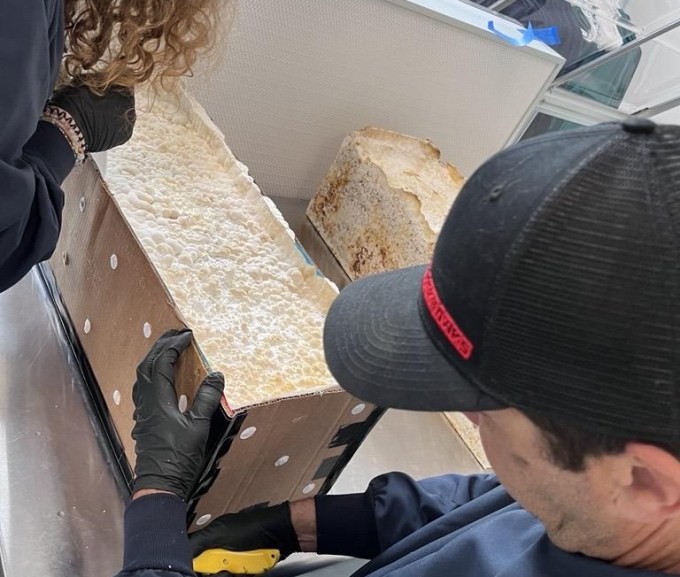
Usually, when something starts to rot, it finally ends up in the trash can. But Joanne Rodriguez wants to turn the concept of rot on its head by growing mushrooms on garbage to turn it into something higher.
“We are training fungi to eat garbage and create renewable, biological raw materials,” she told TechCrunch.
Rodriguez is the founder and CEO of the company Mycocycle, one of the fresh start-ups using fungi, nature’s recyclers, to create plastic-like polymers to save on fossil fuel use. Currently, just about all plastics are produced from oil and gas and they constitute approx 3.4% of total greenhouse gas emissionsaccording to OECD.
“We want to be able to compete with the 3Ms, BASFs and Dows of the world,” Rodriguez said.
That’s no small goal. Plastics are seemingly all over the place, from food packaging to building materials. Thanks to this ubiquity, The global plastics industry is value $624 billion– according to Grand View Research.
Mycocycle hopes to not only capture a part of this market, but also introduce its circular vision by using its mushrooms to literally eat the plastics produced by its competitors.
The company turned to a group of fungi often called white rot fungi. In nature, fungi grow on dead leaves and wood, but Mycocycle fungi were chosen for their ability to break down materials produced by oil and gas. The startup uses natural selection to find people best suited to a given position, without the need to genetically modify varieties. “I drew that line pretty early on,” Rodriguez said.
When the fungi go to work, they break down organic waste, covering it with root-like hyphae. Although hyphae look similar to plant roots, they are not made from cellulose like plant fibers. Instead, they are made from chitin, the same material that insects use to build their exoskeletons. When these hyphae come into contact with carbon molecules, they break them down, using the food source to grow and expand their range.
Rodriguez said Mycocycle mushrooms can work on a big selection of waste materials, including paper, rubber and nylon. In a recent industrial demonstration, the startup grew mushrooms on scrap drywall left over from the construction of a Meta data center. The startup delivered one of its bioprocessors to a nearby garbage collection company, which crushed drywall and dumped it into the processor along with mushrooms from Mycocycle. The bioprocessor then maintained the mushrooms’ optimal temperature, between 60 and 80 degrees F, for about two weeks.
Once the cycle is complete, Mycocycle kills the fungi to prevent them from growing any further. “We don’t want to put mold back in our building,” Rodriguez said. The final result is a product that will be sold, not waste that costs money to eliminate.
The resulting material will be used in a big selection of products, including insulation, acoustic panels for sound control, and fillers for filling things like concrete. (Recycled material from the Meta project will likely turn into filler because the fungi only eat the paper covering the drywall, not the plaster that surrounds it.) The fungi do not eat all of the rubber, but relatively surround it with a network of mycelium, all of which, he said Rodriguez, Mycocycle can recycle when it reaches the end of its life.

Mycoycle, founded by Rodriguez in 2018, is currently working on improving the means of recycling crumb rubber, waste generated from old tires. This is a huge potential market, producing approx 280 million each yr.
To proceed its R&D and commercialization efforts, the company has raised $3.6 million in seed expansion funding, it told TechCrunch exclusively. The round was led by Closed Loop Partners and included investments from Illinois Invent Fund, Telus Pollinator Fund for Good and US Venture.
Rodriguez said Mycocycle will bring in greater than $1 million in revenue this yr. “We will have a positive margin.” She added that the crumb rubber processing a part of the business is probably the most promising.
“One of the strategic investors in this round is specifically looking at this large-scale rubber market precisely because we have been recycling tires the same way for 40 years,” she said. “They see the risk and they see the opportunity.”

